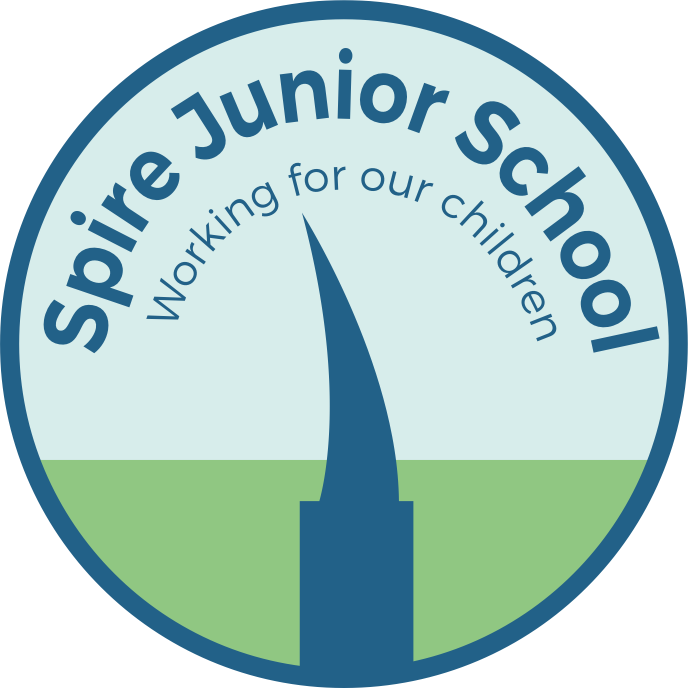RE

Overview of the Subject:
At Spire Junior School, we conduct an RE day every half-term. This means that we can focus on questions and subjects that may need more time to teach within one lesson per week. The children partake in yearly pupil voice questionnaires and the overwhelming view of the children is that they prefer the full day learning, as they feel the information and knowledge they have been taught, sticks.
Religious Education at Spire Junior School aims to teach the children about diverse cultures and religions. We want to encourage the children to explore and be curious about world religions. We follow guidance from The Derbyshire and Derby Agrees Syllabus and there are questions within the guide that aim to give the children a broad and realistic overview of the world we live in today.
We live in a multi-cultural society where the children mix with others, and whilst at Spire Junior school, we teach the main religions that are practised in the United Kingdom today. We learn about Christianity, Islam, Hinduism, Judaism and Sikhism. We also talk about Humanism, and we strongly encourage the children to express their views to challenging and thought-provoking questions. Children enjoy learning about other cultures and religions and show curiosity and a deep interest in others. We are proud of our children who all show compassion, tolerance and understanding of the many different views expressed and talked about within the classroom.

Intent:
The central aim of our school curriculum is to develop the child and shape their minds for positive learning experiences about the world around them. Our aim is for each pupil to know about and understand a range of religions and world views, express ideas about the significance and impacts of religions and gain and deploy the skills needed to engage seriously, based upon a key question approach. We aim to develop children's knowledge about the meaning and the purpose of life, beliefs about God, the issues of wrong and right and what it means to be a human. Our intent is to be sympathetic to the beliefs of others and to gain an understanding of people's different values and identities. Teachers carefully plan their full day RE lesson, choosing questions from The Derbyshire and Derby Agreed Syllabus.
There are three aspects to this syllabus.
Expressing, incorporates religious and spiritual forms of expression and questions about identity and diversity.
Believing, discusses religious beliefs, teachings and sources, purpose and truth.
Living, talks about religious practices, ways of living and questions about values and commitments.

Implementation:
At Spire Junior School, children study RE each half-term, encouraging pupils, irrespective of their own faith or beliefs, to explore questions of spirituality, identity, ethics, discrimination, and prejudice.
RE is an especially important subject to learn whilst at Spire Junior School. It helps to develop their cultural capital and understanding of the world we live in. Therefore, the Agreed Syllabus that we follow is designed to reflect the fact that the religious traditions in Great Britain are in the main Christian while considering that there are many other religions and cultures represented in Great Britain.
The RE syllabus is implemented at Spire Junior School by providing children with a range of experiences and opportunities including,
- Handling Artifacts
- Exploring sacred texts
- Responding to images, games, stories, art, music and dance
- Comparing religions and worldwide views through discussions
- Debating and communicating religious beliefs, world view and philosophical ideas and asking and answering questions.

A typical RE day will usually consist of two or three questions. For instance, during Year 3 and 4s last RE day asked and answered the question ‘Why are festivals important to religious communities’ and ‘What is EID’ The children looked at the many different festivals or events that happen throughout the year. Some of these festivals were religious festivals but they also included Armistice Day, Remembrance Day and Burns night. Although the main focus during RE day is religions, we also look at cultures and traditions important to non-religious persons. The children discussed celebrations that are important to them. They then learnt about Diwali, the festival of lights which is an especially important festival for Hindu’s as it celebrates the welcoming of their new year. They learnt about what is important to Hindus and the traditions that are handed down through the generations. The children designed their own rangoli patterns which are usually bright floor coverings placed by doors to welcome visitors into the home. The children then learnt about Eid, a celebratory occasion to mark the end of Ramadam, a period of fasting, important to followers of Islam.

Impact:
We monitor the children's learning by conducting pupil voice questionnaires, and we are confident that the teaching and learning of RE is pleasurable and exciting, encouraging questioning and discussion. The children are continually assessed throughout the year. RE can be used in all aspects of children's learning and is often linked to other subjects taught in school. The lessons are designed to explore all faiths, beliefs, and spiritual awareness. We work closely with Reverend Sally Anne from the local parish church, St Augustine's. We visit and get involved in the Christmas Tree Festival at St Mary’s Church-The Crooked Spire, where the children create different themed decorations for our tree. We make Christingles every year with the focus on Christianity and the meaning of Christmas. We have also visited the Derby Open Centre where the children take part in a Faith Walk and visit a Mosque and a Gurdwara tasting food, looking at different artefacts and embracing the different beliefs and cultures of others.

What are RE days like?
A typical RE day will usually consist of two or three questions. For instance, during Year 3 and 4s last RE day asked and answered the question ‘Why are festivals important to religious communities’ and ‘What is Eid?’ The children looked at the many different festivals or events that happen throughout the year. Some of these festivals were religious festivals but they also included Armistice Day, Remembrance Day and Burns night. Although the main focus during RE day is religions, we also look at cultures and traditions important to non-religious persons. The children discussed celebrations that are important to them. They then learnt about Diwali, the festival of lights which is an especially important festival for Hindu’s as it celebrates the welcoming of their new year. They learnt about what is important to Hindus and the traditions that are handed down through the generations. The children designed their own rangoli patterns which are usually bright floor coverings placed by doors to welcome visitors into the home. The children then learnt about Eid, a celebratory occasion to mark the end of Ramadan, a period of fasting, important to followers of Islam.
Long-term subject overview:
T1 – Expressing – 2 days (1 day per ½ term)
Year 3
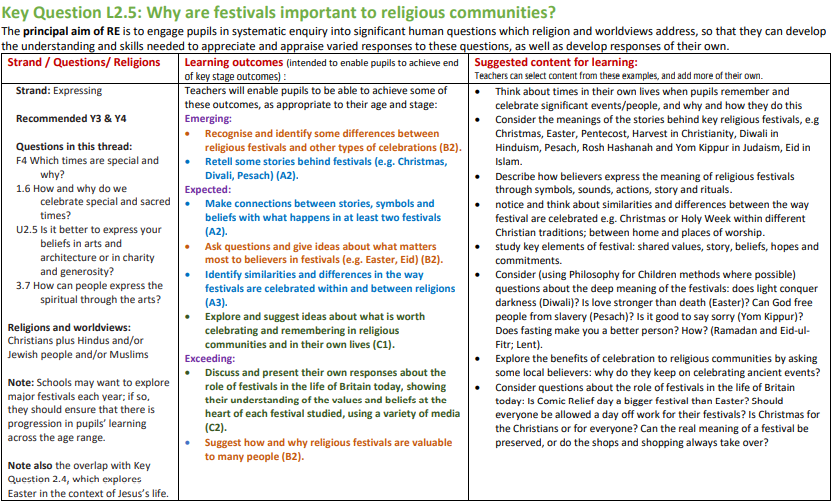
Year 4

Year 5
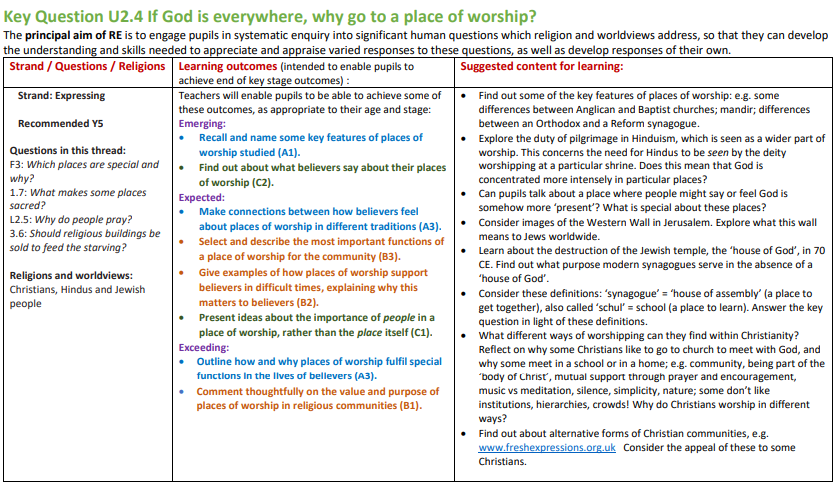
Year 6
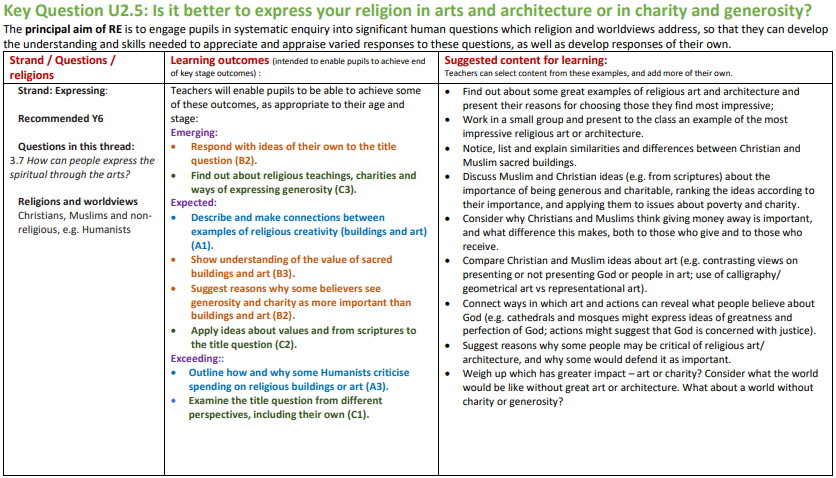
T2 – believing – 2 days (1 day per ½ term)
Year 3

Year 4

Year 5
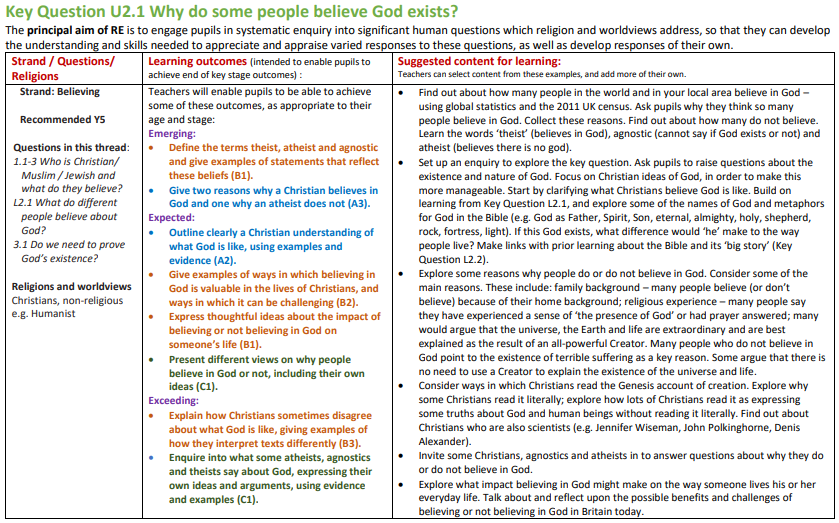
Year 6

T3 – living – 2 days (1 day per ½ term)
Year 3
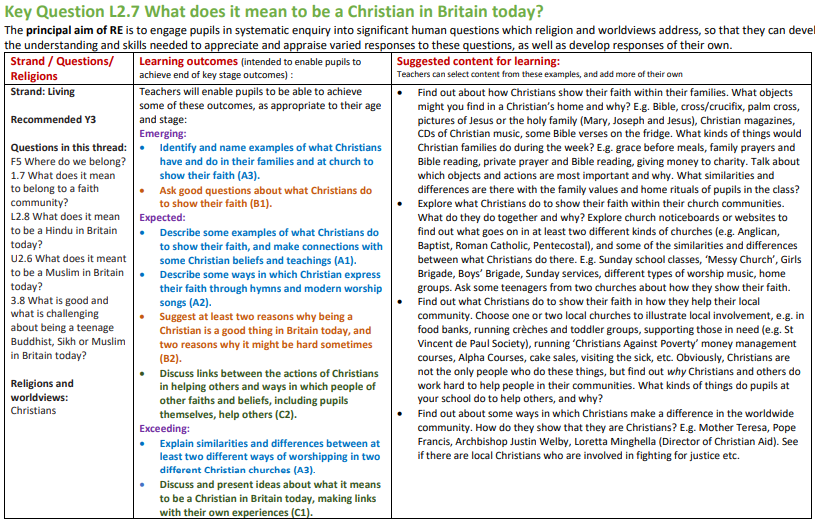
Year 4
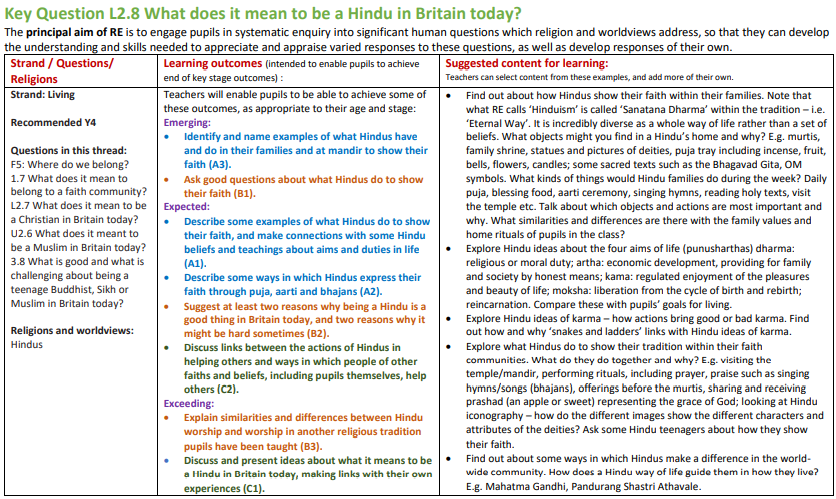
Year 5

Year 6


Subjects at home:
What is Christianity? - BBC Bitesize
What is Islam and what do Muslims believe in? - BBC Bitesize
What Is Judaism? - BBC Bitesize
What is Hinduism? - BBC Bitesize
What is Sikhism and what do Sikhs believe? - BBC Bitesize
BBC Bitesize is a wonderful website for children. All subjects taught in Primary School, have links on this website which includes games, pictures, quizzes etc
Parents / carers are able to withdraw their child from all / part of R.E. lessons.
